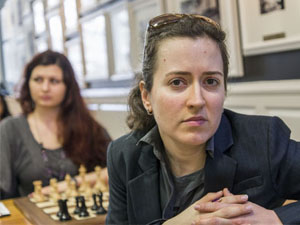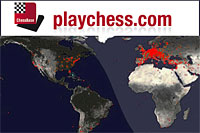
The 2015 U.S. Championship is an elite national championship event, featuring 12 of the strongest chess players in America. Over the course of eleven rounds, these competitors will battle for $175,000 in prize money, qualification into the World Championship cycle, and the coveted title of 2015 U.S. Champion.
U.S. Chess Championship - Round Eight
| Table |
White |
Rating |
Black |
Rating |
Result |
| 1 |
GM Troff, Kayden W |
2532 |
GM Nakamura, Hikaru |
2798 |
0-1 |
| 2 |
GM Gareev, Timur |
2604 |
GM Sevian, Samuel |
2531 |
1-0 |
| 3 |
GM Robson, Ray |
2656 |
GM Shankland, Samuel L |
2661 |
½-½ |
| 4 |
GM Onischuk, Alexander |
2665 |
GM Naroditsky, Daniel |
2633 |
1-0 |
| 5 |
GM Holt, Conrad |
2530 |
GM So, Wesley |
2788 |
1-0 |
| 6 |
GM Akobian, Varuzhan |
2622 |
GM Kamsky, Gata |
2683 |
½-½ |

The Kingside Diner! The Chess Club bought out the bar next door and is now using the space for their new diner! Future lectures will be held at the diner, and although it is not open to the public yet, it is currently being used for the live audience commentary. GMs Ben Finegold and yours truly are hosting that!
Troff, Kayden 0-1 Nakamura, Hikaru
Nakamura was overly harsh about his play today, even if the engines did not agree with him. His claim that if he played like this against someone like Carlsen or Aronian he would lose might have been exaggerated, but he was certainly not happy with the way he played. On the other hand, it looks like a fantastic demolition.
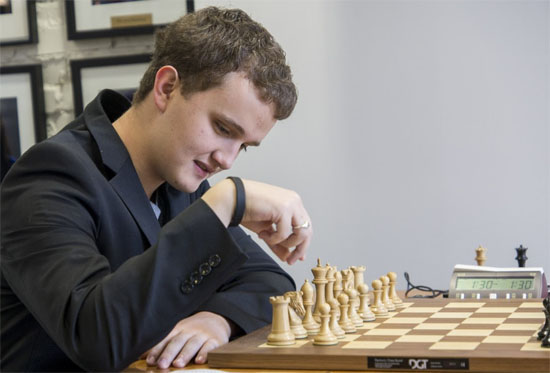
Kayden Troff got a a nice taste of what it is like to play a 2800
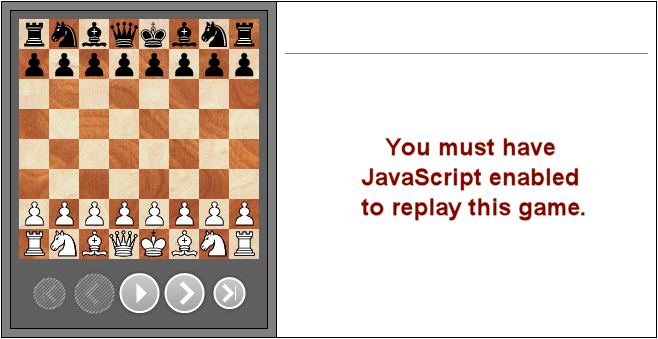
[Event "U.S. Championship 2015"] [Site "Saint Louis"] [Date "2015.04.09"] [Round "8"] [White "Troff, Kayden W"] [Black "Nakamura, Hikaru"] [Result "0-1"] [ECO "A62"] [WhiteElo "2532"] [BlackElo "2798"] [Annotator "Josh Friedel"] [PlyCount "68"] [EventDate "2015.??.??"] [EventCountry "USA"] [SourceDate "2015.02.07"] 1. d4 Nf6 2. c4 e6 3. Nf3 c5 4. d5 exd5 5. cxd5 d6 6. Nc3 g6 {Hikaru likes to play fighting openings for the most part, so the Benoni makes a lot of sense.} 7. g3 Bg7 8. Bg2 O-O 9. O-O Re8 10. Re1 {Nd2 and Bf4 are slightly more popular alternatives, but this is another line.} a6 11. a4 Nbd7 12. e4 Ng4 {Black tries to get counterplay with the Ng4-e5 maneuver, seen often in both the Benoni and the Benko.} 13. Nd2 Nge5 14. Bf1 {This looks undesireable, but it is hard to find a better way to guard against Nd3.} (14. Qc2 {looks more natural, but it runs into} c4 $1 {followed by Nc5 with excellent play for Black.}) 14... g5 $5 {Naka's new idea. This looks weakening, but it is imperative to stop White from playing f4 or else he'll simply find himself worse. Also note that White would love to play Nf1-e3 here, but the f1 bishop is in the way.} 15. h3 {Not an unreasonable response. White wants to discourage g4 ideas.} Qf6 16. Qh5 {Hikaru criticized this move after the game, but I like it a lot. The queen is a little annoying here, and it allows why to transfer a knight to e3 via d1.} Bh6 {Strange looking, but Black needs to free up squares for his pieces.} 17. Nd1 $1 g4 $6 {This move I really don't like, however. It forces Black to give up the dark-squared bishop, after which he'll be completely reliant on concrete play to make up for his positional deficits.} (17... Qg7 {followed by Nf6 looks better, with an unclear position.}) 18. Ne3 Bxe3 19. Rxe3 Qg7 {Black has given up his bishop and opened up his king. Matters aren't so clear, however, because White's pieces have a difficult time coordinating.} 20. hxg4 Nxg4 $6 {This simple move is actually imprecise.} ( 20... Nf6 $1 21. Qh1 Nfxg4 {This is the point. Black can create counterplay with f5 now, since the f-knight has captured on g4.} 22. Re1 f5 $13) 21. Rc3 $6 (21. Re2 {is best, as pointed out by Nakamura after the game. The point is that now after} Ndf6 22. Qh1 Re5 {f2 is defended, so White can simply play} 23. Nc4 Rh5 24. Qg2 {and Black will struggle to make threats. The best try is} Nh2 {, but after} 25. Nxd6 $1 Bh3 26. Qxh2 Bxf1 27. Qxh5 Nxh5 28. Kxf1 {White's pieces and central pawns are more powerful than Black's queen.}) 21... Ndf6 22. Qh1 Re5 $1 {White still has the positional plusses, but Black has a ton of counterplay now.} 23. Qf3 Bd7 $6 {Another move Hikaru was extremely disappointed with after the game. It looks natural, but in positions like this precise calculation matters a lot more. Interestingly, these are moments Naka is usually at his best.} (23... Qg6 $1 {is a better move, immediately putting pressure on e4. The point is that if} 24. Bd3 {for instance,} Bd7 {is a better move, since now} 25. Rb3 Rh5 {and White can't keep his king safe so easily.}) 24. Qd3 $4 {This unfortunate move throws away the game.} (24. Rb3 $1 {was best, and the attack on the b7 pawn is surprisingly annoying. Hikaru thought he was worse or even lost here, but it turns out that after} Qh6 25. Qg2 Rh5 26. Nf3 Qg7 27. Nh4 {The only way to guard e4. It looks as if White will play f3 and consolidate, but Black has the shot} Nxf2 $1 28. Kxf2 Ng4+ 29. Ke2 Re8 {with compensation for the piece. Without this line, however, Black would indeed be worse after Rb3.}) 24... Qh6 25. Bg2 {This loses to a nice tactic, but his position was bad anyway.} (25. Nf3 Qh5 26. Bg2 Rxe4 {and White is busted.}) 25... Qh2+ 26. Kf1 Nxf2 $1 {There might have been a couple innacuracies earlier, but once Hikaru smells his play is very accurate.} 27. Kxf2 Bh3 28. Qf1 (28. Qf3 Ng4+ 29. Kf1 Qh1+ {and Qxg2+ leading to a won ending.}) 28... Rxe4 $1 {The final blow. Black's attack crashes through.} 29. Nxe4 Nxe4+ 30. Ke3 Bxg2 {The rest is simple.} 31. Qf4 Nxc3 32. Qg5+ Kf8 33. bxc3 Re8+ 34. Kf2 Bh1+ {and Kayden resigns before allowing Hikaru to give mate. Similar to some other games this tournament, Nakamura made a couple uncustomary errors to give his opponent some chances. Once the big error was made, however, he was his usually unforgiving self.} 0-1
Gareev, Timur 1-0 Sevian, Samuel
An important lesson for young Sevian: even the "weaker" players in this tournament are extremely strong.
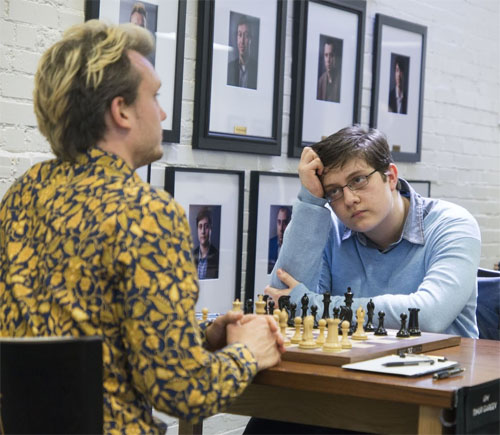
Sevian might have underestimated his opponent today

[Event "U.S. Championship 2015"] [Site "Saint Louis"] [Date "2015.04.09"] [Round "8"] [White "Gareev, Timur"] [Black "Sevian, Samuel"] [Result "1-0"] [ECO "A45"] [WhiteElo "2604"] [BlackElo "2531"] [Annotator "Josh Friedel"] [PlyCount "57"] [EventDate "2015.??.??"] [EventCountry "USA"] [SourceDate "2015.02.07"] 1. d4 Nf6 2. Bg5 c5 3. d5 Qb6 {Sevian plays one of the greedier lines against the Trompowsky.} 4. Nc3 Qxb2 {Principled and risky.} 5. Bd2 Qb6 6. e4 d6 7. Rb1 Qd8 8. f4 {Black is up a clean pawn, but White has a development lead and a huge center.} g6 9. Bb5+ Nfd7 {This almost reminds me of a Benoni, with White missing a pawn but having a couple extra pieces out.} 10. a4 {White wants to ensure a6-b5 doesn't free Black's queenside.} Bg7 11. h4 $5 {Objectively I'm not sure about this move, but it's in the spirit of things at least.} (11. Nf3 {is what most of us would play I'm sure.}) 11... h5 {During the game I didn't like this move, but it might not be so bad.} (11... a6 {was what I anticipated, planning Nf6 next move and freeing his pieces somewhat.}) 12. Nh3 a6 13. Be2 c4 $6 {A little panicky, and the start of bad times for Sam.} (13... Nf6 {and it isn't clear to me where White's attack will come from.}) 14. Ng5 Qa5 $2 {This is just asking for it.} (14... Nc5 {is a reasonable continuation to c4, and the position remains unclear.}) 15. e5 $1 {Of course.} dxe5 $2 {This is too greedy.} (15... Nc5 {Once again, I wanted to get my knight out.}) 16. d6 $1 { By far the best, and possibly what Sevian underestimated. Black is already busted.} exd6 $2 {Sevian was in a taking mood, but this leads to disaster.} ( 16... Qc5 17. Nce4 Qd4 {was a better defense, but after} 18. dxe7 {Black is still in big trouble.}) 17. Nce4 (17. Bxc4 {is even more straightforward.}) 17... Qc7 18. Bb4 O-O 19. Bxd6 (19. O-O {I kind of like playing this first, leaving Black's position in ruins, but Timur's move is also good.}) 19... Qc6 ( 19... Qa5+ {might put up more resistance, but after} 20. Bb4 Qc7 21. O-O {it's still over.}) 20. f5 {Anything wins, but Timur decides to be brutal. Note how Black has no way to develop his queenside, while all White's pieces are menacing. Material is practically irrelevant here.} Nf6 (20... gxf5 21. Bxc4 $1 Qxc4 22. Qxh5 {and Black has to sac the queen to stop mate, although even that is only temporary.}) 21. Bf3 Qd7 22. fxg6 Nxe4 (22... fxg6 23. O-O {and Black is helpless.}) 23. gxf7+ Qxf7 {Desperation, but it doesn't change anything.} 24. Nxf7 Nc3 25. Qd2 Nxb1 26. Nh6+ Kh7 27. Qg5 Rxf3 28. gxf3 Bxh6 29. Qe7+ { Black finally decided he'd had enough. Quite a crushing victory by Gareev, who chalks up his first win of the tournament in style. Sevian will be severely disappointed, but I bet he'll never neglect development like that ever again.} 1-0
Robson, Ray ½-½ Shankland Sam
Shankland's pressure on the queenside in this Classical French seemed to give him an advantage. His attack on the queenside was certainly faster than Robson's on the kingside. However as Robson pointed out after the game, it was tricky as he somehow was able to hold down the queenside. Shankland traded off all the rooks on the c-file to draw before there were any real losing chances.
Onischuk, Alexander 1-0 Naroditsky, Daniel
A wonderful positional approach by Onischuk. Anish Giri summarizes the game well:
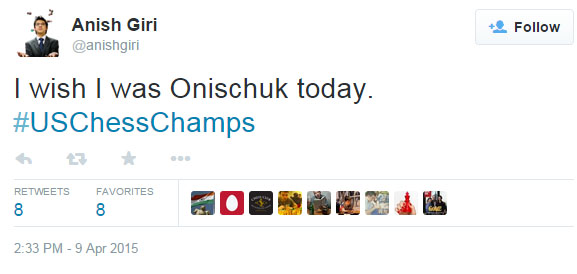
Black's bishop on a8 was rather sad and basically cost Naroditsky the game. Another tough loss for Naroditsky who is now on -5 in this tournament
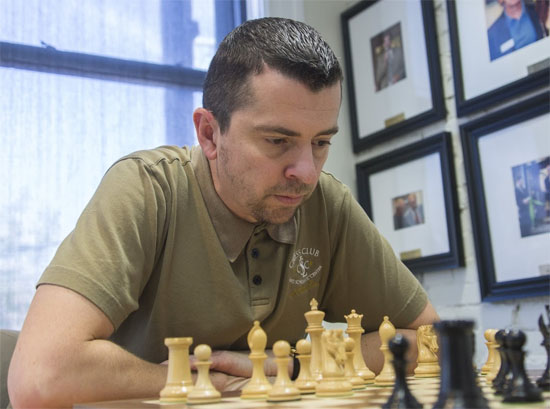
Alexander Onischuk's last three games have been decisive, not something that is common for him
Holt, Conrad 1-0 Wesley, So
This would normally be the game of the day, if there were not so many awesome games to look at! Holt's amazing preparation netted him a piece for two pawns, but So retained a strong initiative. Interestingly after So played basically the only move after Holt's preparation, the University of Texas at Dallas student sank into a 55 (!) minute think.
So played somewhat strangely with a further sacrifice. Holt took the material, defended precisely and won a nice game.
Akobian, Varuzhan ½-½ Kamsky, Gata
Akobian didn't make much of an effort to win, while Kamsky was ok with a draw with black.
Pairings for Round Nine
| Table |
White |
Rating |
Black |
Rating |
Result |
| 1 |
GM Kamsky, Gata |
2683 |
GM Troff, Kayden W |
2532 |
|
| 2 |
GM So, Wesley |
2788 |
GM Akobian, Varuzhan |
2622 |
|
| 3 |
GM Naroditsky, Daniel |
2633 |
GM Holt, Conrad |
2530 |
|
| 4 |
GM Shankland, Samuel L |
2661 |
GM Onischuk, Alexander |
2665 |
|
| 5 |
GM Sevian, Samuel |
2531 |
GM Robson, Ray |
2656 |
|
| 6 |
GM Nakamura, Hikaru |
2798 |
GM Gareev, Timur |
2604 |
|
Standings

Replay Round Eight Games
Select from the dropdown menu to replay the games
U.S. Women's Championship - Round Eight
| Table |
White |
Rating |
Black |
Rating |
Result |
| 1 |
WCM Virkud, Apurva |
2132 |
WGM Sharevich, Anna |
2267 |
½-½ |
| 2 |
WIM Wang, Annie |
1901 |
IM Goletiani, Rusudan |
2311 |
0-1 |
| 3 |
FM Melekhina, Alisa |
2235 |
GM Krush, Irina |
2477 |
0-1 |
| 4 |
WGM Abrahamyan, Tatev |
2322 |
IM Paikidze, Nazi |
2333 |
½-½ |
| 5 |
WFM Yu, Jennifer R |
2180 |
WIM Ni, Viktorija |
2188 |
0-1 |
| 6 |
WGM Nemcova, Katerina |
2279 |
WGM Foisor, Sabina |
2235 |
½-½ |

The production team is always busy, before and after the round
Virkud, Apurva ½-½ Sharevich, Anna
A pretty even game all through-out, though it feels that Virkud's awkward piece placement should have been punished somehow.
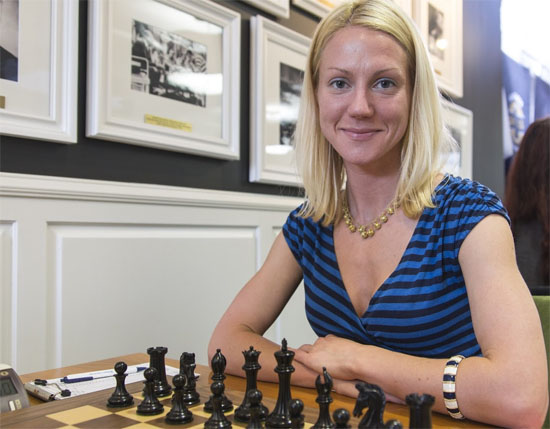
Anna Sharevich attends Webster University in Saint Louis.
Her teammate, Katerina Nemcova, is leading this tournament!
Wang, Annie 0-1 Rusudan, Goletiani
Nothing much to say about this game. Annie Wang placed her pieces in the worst squares possible, if anything anti-developing. Goletiani ripped apart the kingside with very obvious sacrifices and won.
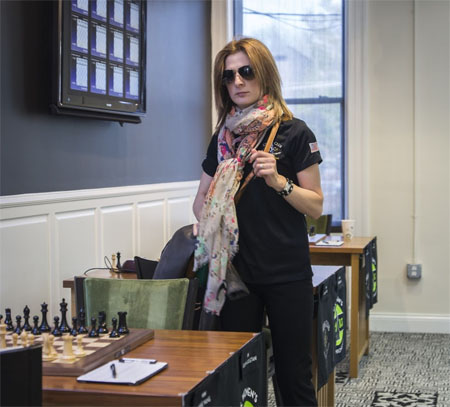
Rusa Goletiani ready for action
Melekhina, Alisa 0-1 Krush, Irina
A very nice effort from the defending Champion, demolishing her opponent's positionally

[Event "U.S. Womens Championship 2015"] [Site "Saint Louis"] [Date "2015.04.09"] [Round "8"] [White "Melekhina, Alisa"] [Black "Krush, Irina"] [Result "0-1"] [ECO "B22"] [WhiteElo "2235"] [BlackElo "2477"] [Annotator "Josh Friedel"] [PlyCount "74"] [EventDate "2015.??.??"] [EventCountry "USA"] [SourceDate "2015.02.07"] 1. e4 c5 2. c3 {Alisa hasn't lost faith in her favorite line against the Sicilian.} Nf6 3. e5 Nd5 4. d4 cxd4 5. cxd4 d6 6. Nf3 Nc6 7. Bc4 e6 8. O-O Be7 9. Qe2 O-O 10. Nc3 Nxc3 11. bxc3 dxe5 12. dxe5 Qc7 13. Qe4 {All theory so far. Similar to Alisa's game against Nemcova, she has a broken pawn structure in exchange for a slight initiative. Unlike that game, her opponent has managed to castle.} b6 14. Bg5 Bb7 15. Bd3 g6 16. Bf6 {This has all been played before. In the long term Black has nice strategic trumps, but she'll have to get there in order to enjoy them.} (16. Qh4 {is another way to play.}) 16... Rfd8 17. Qe3 Rd5 18. Be4 Rc5 {The rook puts pressure on both e5 and c3 from this square.} 19. Rfd1 Rc8 $6 {I'm not sure I'm crazy about the rook on this square.} (19... Rd8 {looks better to me, as piece trades will be useful for Black in general, although after} 20. h4 {White still has attacking prospects.}) 20. Rd3 $6 { This looks very passive.} (20. Ng5 $1 {This active move looks more pointed.} Nxe5 21. Bxe7 Qxe7 22. Bxb7 Qxb7 23. Ne4 {and Black has to sac an exchange with a move like} Kg7 {While I don't think matters are so clear, White can't be any worse here.}) 20... Ba6 21. Rd2 Nxe5 $1 {I like this decision a lot, largely for practical reasons.} (21... Na5 {is also tempting, but after} 22. Qh6 Bf8 23. Qh4 Rxc3 24. h3 {White still has attacking prospects to compensate for the pawn.}) 22. Bxe5 Rxe5 23. Nxe5 Qxe5 {White has snagged an exchange, but in my opinion her position is much harder to play. Black's pieces and structure are better, and it is difficult to do anything active with the rooks. } 24. Qd4 $6 {Already an inaccuracy. White had to aim for piece trades ASAP.} ( 24. Bd3 Qxc3 25. Rad1 Bb7 26. Rc2 {White has given up a pawn, but takes a pair of rooks off the board, which greatly improves her chances.} Qa3 27. Rxc8+ Bxc8 {and I think a draw is the most likely result.}) (24. Bb7 $5 {is even possible, with the idea that on} Qxe3 25. fxe3 Bxb7 26. Rd7 {and White wins the piece back with a drawish ending.}) 24... Qg5 {Now White can't force any pieces off, and the position is very hard to defend.} 25. Rad1 Rc4 $6 {This move is tempting, but the move order wasn't the most accurate.} (25... Bb5 {with Rc4 coming next is better, since the queen has no good squares now.}) 26. Qd3 Bb5 27. Rb2 $6 (27. Qb1 {was a sturdier defense, with the idea that on} Rxc3 28. Rc2 $1 {White can force the rooks off.}) 27... Qc5 28. Bf3 $6 {Not best, but the position is a nightmare to play. This really shows the practical value of the exchange sac, since Black's moves are so much easier to find than White's.} (28. Qe2 {was best, preparing Rd3 in response to Ba4. Not very human.}) 28... Ba4 29. Re1 Bf6 {Black is in no rush to take the pawn.} 30. Qe3 $2 {Losing by force, but Alisa was facing a huge uphill battle.} (30. Rc1 {pretending to guard the pawn looks better, with the idea that at least some trades might happen.}) 30... Bxc3 31. Rd2 {A self-skewer is never a good sign.} Bxd2 32. Qxd2 Rc2 {The rest is trivial.} 33. Qd8+ Kg7 34. Qh4 Rc1 35. Qe4 Qc3 36. Rf1 Rxf1+ 37. Kxf1 Bb5+ {and with mate coming, Alisa resigned. The opening if anything went well for White, but one inaccuracy allowed this very nice exchange sac, and after that the position was simply far nicer to play with Black. With this win, Krush also moves within striking distance of Nemcova, ensuring the tournament will get super heated in the later rounds.} 0-1

Irina Krush played perfectly today
Abrahamyan, Tatev ½-½ Paikidze, Nazi
A heartbreaking draw for Abrahamyan, who seemed on her way to catch up with the leaders.

[Event "U.S. Womens Championship 2015"] [Site "Saint Louis"] [Date "2015.04.09"] [Round "8"] [White "Abrahamyan, Tatev"] [Black "Paikidze, Nazi"] [Result "1/2-1/2"] [ECO "B19"] [WhiteElo "2322"] [BlackElo "2333"] [Annotator "Josh Friedel"] [PlyCount "133"] [EventDate "2015.??.??"] [EventCountry "USA"] [SourceDate "2015.02.07"] 1. e4 c6 {Nazi expresses her Georgian heritage.} 2. d4 d5 3. Nc3 dxe4 4. Nxe4 Bf5 5. Ng3 Bg6 6. h4 h6 7. Nf3 Nd7 8. h5 Bh7 9. Bd3 Bxd3 10. Qxd3 e6 11. Bd2 { All main line so far.} a5 $5 {A very unusual move, but not unheard of. It looks strange at a glance, but the point will become clear next move.} 12. O-O-O Bb4 {White has to make a decision now. Trading the bishops tends to be useful for Black, so Tatev chooses to create a slight weakness in order to keep them on the board.} 13. c3 $5 (13. Ne4 Ngf6 14. Nxf6+ Nxf6 15. Ne5 {looks like safer continuation for White.}) 13... Be7 14. Qe2 {The queen is never happy on d3 in these lines.} Ngf6 15. Ne5 O-O 16. f4 Re8 {Logical play so far.} 17. Kb1 a4 18. Nf1 $6 {This move is extremely provocative.} (18. Ne4 {looks better, moving the knight to a more active square.}) 18... a3 19. b3 c5 {Nazi chooses the proper moment to challenge the center.} 20. g4 (20. dxc5 Nxc5 {is comfortable for Black.}) 20... cxd4 21. g5 {Tatev goes for the throat, as is her tendency. While the whole thing has a dubious feel to it, it's not easy to prove over the board.} dxc3 $2 {Nazi panics here.} (21... hxg5 {It was best to take up the guantlet.} 22. fxg5 (22. h6 Nxe5 23. fxe5 Qd5 24. Ng3 d3 25. Qe1 Ng4 26. hxg7 Qxe5) 22... Nxe5 23. gxf6 gxf6 {and after this slightly odd recapture, it is unclear whether White will have adequate compensation. Admittedly, in a practical game, anything is possible here.} (23... Bxf6 24. Ng3 {gives White some compensation.}) 24. Be3 Qd5) 22. gxf6 c2+ {This is necessary, or else after Bxc3 White is just winning.} 23. Kxc2 Nxf6 24. Kb1 { It's not so easy to convert the extra piece, but White is clearly on top here.} Rc8 $6 {An improving move, but Black had to be more direct.} (24... Qd4 25. Bc1 Ne4 $1 {creates more counterplay. Now forced is} 26. Rxd4 Nc3+ 27. Ka1 Nxe2 28. Rc4 {and while White will be better if she untangles, matters are far from easy.}) 25. Ng3 $1 {The best move, getting the knight off the back rank. White's advantage is rather large now.} (25. Ne3 Qd4 {is messier.}) 25... Nd5 26. Rhe1 $2 {I'm typically a fan of centralization, but the rook doesn't really belong here.} (26. Ne4 {improving the knight would be my choice, and likely one good move out of many.}) 26... Qb6 $1 {Now there is trouble again.} 27. Ne4 f5 28. Nf2 Rc3 $2 {This looks threatening, but it isn't Black's best.} (28... Bh4 {was more annoying, and now forced is} 29. Nfd3 (29. Rf1 $2 Rc3 $1 30. Nfd3 Qd4 {and White is in trouble.} 31. Rc1 Rxd3 32. Nxd3 Bf6 33. Kc2 Rc8+ 34. Kd1 Rxc1+) 29... Bxe1 30. Rxe1 {and while I still would take White's minors over the rook, the position is still a mess.}) 29. Nfd3 $1 {Best, and White is again on top.} Rec8 (29... Qd4 30. Be3 {and Black has nothing. Note how with the rook on f1 this move wouldn't be possible.}) 30. Rc1 Rxc1+ 31. Rxc1 Rxc1+ 32. Kxc1 $6 {Both sides were getting low on time here, so the play isn't the most precise.} (32. Nxc1 {allows less counterplay.}) 32... Qg1+ $6 ( 32... Qd4 {followed by Qa1 is more accurate. The point is that} 33. Kb1 Bf6 { and White's pieces are overloaded.}) 33. Kc2 $6 (33. Qe1 {keeps everything under control, as now after} Qd4 34. Kb1 Bf6 35. Kc2 {and Black is out of tricks. The key is that the queen on e1 controls the a1 square.}) 33... Qa1 34. Nc1 {Despite allowing the queen to a1, White more or less has it under control. } Bf6 $2 (34... Qb2+ 35. Kd1 Qd4 {and White still has pesky threats to contend with.}) 35. Ned3 $6 (35. Ng6 {wins the e6 pawn, since after} Nc7 (35... Kf7 36. Qb5 {wins.}) 36. Qc4 {Black can't do anything.}) 35... Nc7 36. Bb4 Bb2 37. Bd6 Bxc1 38. Nxc1 Qb2+ 39. Kd1 Qd4+ 40. Qd2 {Tatev has reached time control, and finally has things under control. Despite that, this position is not an easy technical task, and converting the advantage will require precise technique.} Qg1+ 41. Kc2 Nd5 42. Bxa3 (42. Qe2 {keeps the h-pawn guarded, and wins more easily.}) 42... Qh1 43. Nd3 {White has to give up on h5 now.} Qxh5 44. Bb2 Qf3 45. a4 h5 {White is still much better, but precision is required here.} 46. Bd4 $6 (46. Qe1 $1 {is best, attacking e6 and guarding against the pawn advance.}) 46... h4 {This pawn will cause headaches for White.} 47. Qf2 Qh5 $6 (47... Qg4 {right away is stronger.}) 48. Qg1 Qf7 $2 {But this move is way too passive.} ( 48... Qe2+ 49. Kc1 Qg4 {looks like a better try.}) 49. Kb2 (49. Qg5 {wins more easily.}) 49... Nf6 50. Qg5 h3 51. Nf2 h2 52. Qh4 $2 (52. Qg2 $1 {keeping the g-pawn pinned and taking the h-pawn will no fuss wins on the spot.}) 52... Qd7 53. Bxf6 $2 {Tatev was low on time again, and this move looks panicky.} ({The calm} 53. Bc3 {keeps the king safe and retains winning chances.}) 53... Qd2+ 54. Ka3 Qd6+ $2 (54... gxf6 {leads to a perpetual.} 55. Qxh2 Qc1+ 56. Kb4 Qd2+ 57. Kb5 Qd5+ 58. Kb6 Qd6+ 59. Ka7 Qd4+ 60. Ka8 Qd8+ 61. Kxb7 Qd7+ {and White can't escape checks.}) 55. b4 gxf6 56. Qxh2 {White should be winning here, but Tatev was definitely lamenting spending so much time.} Qd4 57. Qg3+ Kh8 58. Nd3 (58. a5 {I prefer this move, giving the king more breathing space while expanding on the queenside.}) 58... Qc3+ 59. Ka2 b6 60. Qe3 Kh7 61. Qe2 Kg6 62. Qd1 $6 {Allowing e5 is unnecessary.} (62. b5 {I like this move, keeping the pawn guarded and preparing Nb2-Nc4.}) 62... e5 63. Qg1+ (63. b5 {Once again I like this idea, but it is more complicated now.} e4 64. Nb2 Qe3 65. Qf1 {and White keeps everything guarded}) 63... Kf7 64. Qd1 Kg6 65. Qg1+ Kf7 66. Qd1 Kg6 67. Qg1+ {The position was extremely hard to win, but there was no reason to take a draw. Quite an exciting game, with time pressure deciding the outcome as it has in many games this tournament.} 1/2-1/2
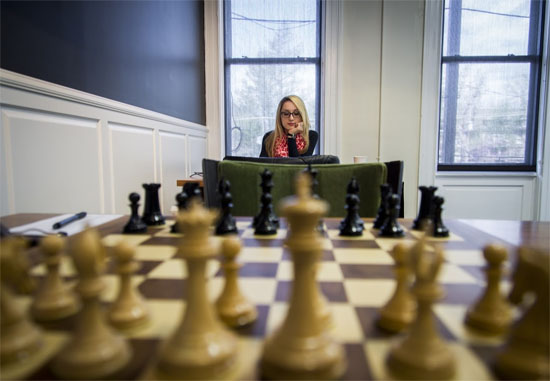
Nazi Paikidze escaped almost by miracle
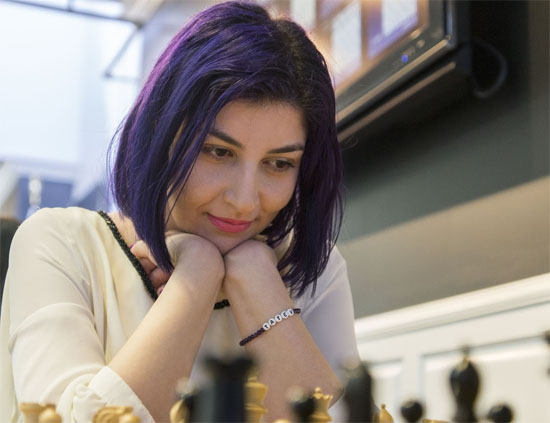
Tatev Abrahamyan has been haunted by time pressure the entire tournament
Yu, Jennifer 0-1 Ni, Viktorija
After several mistakes from Yu, Ni obtained a crushing initiative. The only question is how Yu was able to hold on as long as she did.

Jennifer Yu has had a very tough tournament. She is only half a point ahead of Annie Wang, who is last.
Nemcova, Katerina ½-½ Foisor, Sabina
Nemcova obtained a slight advantage from her 2.c3 Sicilian, but Foisor outplayed her slightly. Nemcova had to be a little careful not to be worse, but held the endgames without problems.

A big smile after drawing with the leader!
Pairings for Round Eight
| Table |
White |
Rating |
Black |
Rating |
| 1 |
WGM Foisor, Sabina |
2235 |
WCM Virkud, Apurva |
2132 |
| 2 |
WIM Ni, Viktorija |
2188 |
WGM Nemcova, Katerina |
2279 |
| 3 |
IM Paikidze, Nazi |
2333 |
WFM Yu, Jennifer R |
2180 |
| 4 |
GM Krush, Irina |
2477 |
WGM Abrahamyan, Tatev |
2322 |
| 5 |
IM Goletiani, Rusudan |
2311 |
FM Melekhina, Alisa |
2235 |
| 6 |
WGM Sharevich, Anna |
2267 |
WIM Wang, Annie |
1901 |
Standings

Replay Round Eight Games
Select from the dropdown menu to replay the games
Commentary provided for the Chess Club and Scholastic Center of Saint Louis by Josh Friedel:
Joshua Friedel
Josh was born in 1986 in New Hampshire, USA and is currently living in Wisconsin. He obtained his international master title in 2005 and his grandmaster in 2008. He has participated in six US Championships, including a tie for fourth in 2008. Major Open tournament victories include: the 2003 Eastern Open, 2005 Berkeley Masters, 2008 National Open, 2009 Edmonton International, 2009 North American Open, 2010 Saint Louis Open, 2010 American Open, 2013 Chicago Open.
Josh will be annotating the games for the Saint Louis Chess Club. |
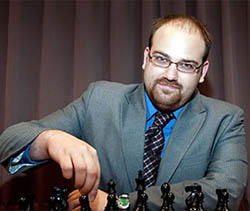 |
Photos by Lennart Ootes
